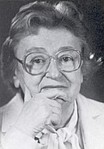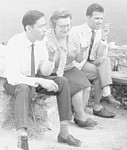Developments from 1969 until 1990
Shortly after receiving his emeritus and retiring, Prof. Rheinwald died in 1969. Hartmut Albrecht was selected as his successor at the Institute of Communication Research and Agricultural Extension. Albrecht completed his post doctorate degree in Gottingen with his book about the innovation processes in agriculture. He was elected as dean shortly after starting as professor. These were turbulent times at the Universities. From the re-structuring of the faculties the Institute for Agricultural Sociology, Extension and Applied Psychology emerged from the former Institute of Agricultural Communication and Extension, and the Department for Agricultural Sociology of the Institute for Agricultural Politics (Professor Ulrich Planck). The independent Psychology department was under the leadership of Ms. Prof. Hruschka and originated from the previous Institute for Agricultural Extension.
The re-allocation of the department came at a turning point in agricultural politics (Mansholt-Plan, Hoecherl-Plan etc). Under increasing international competitive conditions “viable” farms should be developed, while those who had decided to exit agriculture, were to be given the support they required to make the change to other professions (Socio-Economic Extension). Now it showed that the governmental extension service had been working on the content questions (Production Technology, Labour Market, Markets, Business Management, etc.) almost exclusively for over two decades; methodological questions had practically been left untouched. In this situation, Hruschka and Albrecht gave the first methodological courses for many extension training institutes in the German speaking region and introduced this specialised field of work.
Due to the current situation, a special emphasis was placed on the area of socio-economic extension, later combined with working in the areas of organisation and management of extension, farm management behaviour, methods of adult training (especially targeting groups that were difficult to reach), technical communication, information behaviours of farmers, and of the methodological problems of nutrition, household and consumer extension.
Domestically, urgent research tasks arose mainly from the increasing difficulties in agriculture (farms at risk of bankruptcy), conflicts of interests between the business interests of farmers and environmental interests of the public, the search for “compatible” solutions and, concerning extension, the search for possibilities to retain the functionality of the governmental official extension even under difficult conditions (the multiplication of sovereignty and administration tasks with stagnant or diminishing capacity).
The governmental official service and the churches offered a special extension service for those businesses facing bankruptcy. The experience exchange among the advisors in the state of Baden-Wuerttemberg was initiated and accompanied by the department and this also led to a national collaboration.
Newly developed after 1975, was the area of research in developing countries. This came about partly from the demand of national and international institutions and partly from the development of the Tropenzentrum at University Hohenheim and the special research programme in West Africa. Tasks completed were related to the problems of situation analysis, communication (Egypt), organisation and methods (Iran, Turkey and Egypt), comparison of organisational history (Taiwan) and needs analysis for development planning (Iran). The demand in this area grows. This is also the case with inquiries from PhD candidates from Third World countries. In the setting of the partnership with the Agricultural University of Beijing (<st1:country-region w:st="on"><st1:place w:st="on">China</st1:place></st1:country-region>) extension research was initialised and an institute for extension established. There in the last years, the focus shifted to questions regarding intercultural communication, sharing of local expertise (indigenous knowledge), organisation and management, participation and self help, co-operation in knowledge systems (research, extension and user systems), function of extension in “farming systems research” and with the development of the location specific and socially equitable innovations.
With significant involvement from the department, in 1981 the German Organisation for Technical Cooperation (GTZ) published a two-volume handbook for the field of extension in the third world. In 1987/88 it was re-published as a re-edited second edition, also available in French and Chinese (volume 1) English and Spanish (both volumes). Former and present staff of the department were involved with conducting training seminars and workshops for German and foreign specialists with the DSE in Bad Honnef and Feldafing, with the LBL (now AGRIDEA) in Switzerland, with the Evangelic Academy Bad Boll and further co-operation partners.
Prof. Dr. Erna Hruschka
Department of Behaviour Research and Applied Psychology
 | In 1951, Erna Hruschka (born 18.12.1912) started as a technical assistant with Prof. Rheinwald. It was only later that she studied Psychology in Tubingen and then returned to the institute, where in 1959, she received her PhD. Her post doctorate research “Attempt of a Theoretical Basis on the Extension Process” was a milestone for the further work of the institute. Together with Hartmut Albrecht, she developed methodological courses for agricultural and household economics extension specialists from Italy, Switzerland, and Austria in the 1970’s. Her lectures left a lasting impression on the students. She was not only teaching in the classical sense, but also offered psychological advice to learning and real life problems. She followed M. von Wrangell as Hohenheim’s second female professor and when she retired in 1974, the psychology department was permanently established at Hohenheim. Erna Hruschka passed away on 24.03.1996. |  |
